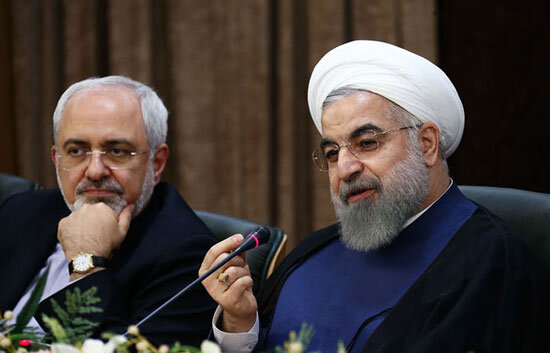Sanctioning Zarif is sanctioning diplomacy

TEHRAN – In separate statements on Wednesday, the U.S. Treasury and State Department announced imposition of sanctions against Iranian Foreign Minister Mohammad Javad Zarif, a move which was interpreted as a total rejection of diplomacy repeatedly claimed by the Trump administration.
At home there was a huge torrent of support for Foreign Minister Zarif who is liked by the people and even his moderate opponents. They all consider him a highly qualified diplomat and treasure him for his rationality.
Vice President Es’haq Jahangiri lauded Zarif’s diplomatic capability, saying, “Even wise enemies are aware of his intellect, skill, his rare competence in negotiations, creating opportunities, and avoiding conflict and war.”
“Sanctioning Zarif is another reason for (U.S.) hypocrisy and lying in calling for negotiations,” Jahangiri wrote on his Twitter account.
“U.S. is afraid of Zarif”
President Rouhani described the U.S. move against his foreign minister as a “childish behavior”.
Deputy Foreign Minister Abbas Araghchi says Zarif is “powerful language of Iran’s diplomacy and powerful representative of Iran in the international arena”.In a televised address, Rouhani said, “They were claiming ever day ‘we want to talk, with no preconditions’ ... and then they sanction the foreign minister.”
He also said the U.S. is “afraid” of Zarif.
“They are afraid of our foreign minister’s interviews. It is completely clear that the foundations of the White House have been shaken by the words and logic of an informed, devoted and diplomatic individual,” the president pointed out.
He added, “Our enemies are so helpless that they have lost the ability to act and think wisely.”
On Wednesday, Zarif responded to sanctions on himself in a tweet.
“The US’ reason for designating me is that I am Iran’s ‘primary spokesperson around the world’
Is the truth really that painful?” Zarif wrote.
Zarif said the move shows that Donald Trump and his team consider him as a “huge threat” to their plots against Iran.
“Thank you for considering me such a huge threat to your agenda.”
Zarif added, “It has no effect on me or my family, as I have no property or interests outside of Iran.”
‘Zarif sanctions indicate U.S. frustration’
Iran’s Foreign Ministry also issued a statement on Thursday saying that imposition of sanctions on Zarif indicates the “U.S. government’s frustration”.
“The U.S. new sanctions reveals this government’s weakness and fear of the Islamic Republic of Iran’s wise and logical diplomacy,” the statement read.
It added, “Imposing sanctions on the foreign minister will have no effect on the Foreign Ministry’s efforts and actions and also the foreign minister, as responsible for the country’s foreign policy, in upholding the Iranian people’s righteousness, defending the national interests and countering economic terrorism.”
Also in a tweet on Thursday, Foreign Ministry spokesman Abbas Mousavi said the U.S. is extremely fearful of Zarif’s “logic” and “art of negotiation”.
Deputy Foreign Minister Abbas Araghchi also said in a message on his Instagram page that Zarif is “powerful language of Iran’s diplomacy and powerful representative of Iran in the international arena”.
Dianne Feinstein, a California Democratic senator, criticized the move, saying it was a “mistake” to sanction Zarif and described him as a “capable” diplomat.
“President Trump says he pulled out of the Iran nuclear agreement to force Iran back to the negotiating table, but this move limits the opportunity to do exactly that,” she said.
“We think all diplomatic channels should stay open”
France said on Thursday that along with its partners the UK and Germany it was concerned by the U.S. decision to apply sanctions on Zarif.
The French foreign ministry said, “We think that all diplomatic channels should stay open, especially at this moment of increased tensions.”
“Sanctions cannot silence the telling and reasoned language of Zarif,” Majid Takht Ravanchi notes.Deputy Permanent Representative of Russia to the United Nations Dmitry Polyanskiy slammed the U.S. move, arguing that the measure will block the way for any dialogue.
Polyanskiy said the sanctions go against diplomacy, stressing that Moscow is against any type of bans, as they do not help find a solution.
At a news conference on Thursday, Russian Foreign Ministry spokeswoman Maria Zakharova also condemned the move.
"The U.S. has only one tool – sanctions. This tool does not work. This tool has not approved itself. This tool has discredited both itself and those who apply it," she remarked.
Majid Takht Ravanchi, Iran’s permanent representative to the United Nations, told IRNA that sanctions on Zarif shows the lack of sincerity on the part of the U.S. in seeking negotiations.
“Sanctions cannot silence the telling and reasoned language of Zarif,” noted Takht Ravanchi who was a negotiator with the 5+1 countries in crafting the 2015 nuclear deal.
NA/PA
